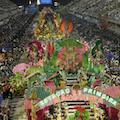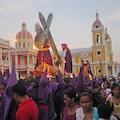Search results
Mardi Gras (UK: / ˌ m ɑːr d i ˈ ɡ r ɑː /, US: / ˈ m ɑːr d i ɡ r ɑː /; also known as Shrove Tuesday) is the final day of Carnival (also known as Shrovetide or Fastelavn); it thus falls on the day before the beginning of Lent on Ash Wednesday.
- Mardi Gras in The United States
Mardi Gras in the United States is celebrated in a number of...
- Ash Wednesday
Ash Wednesday is a holy day of prayer and fasting in many...
- Carnival
Carnival in Rome, c. 1650 Rio's Carnival is the largest in...
- Mardi Gras in New Orleans
The holiday of Mardi Gras is celebrated in southern...
- Mardi Gras in The United States
Jan 25, 2010 · Learn about the origins, meaning and customs of Mardi Gras, a Christian holiday and cultural festival that dates back to ancient pagan rites. Find out when and where Mardi Gras 2024 will be celebrated around the world, especially in New Orleans.
- 1 min
Plan your trip to the Big Easy for the ultimate Mardi Gras experience. Find out the parade schedule, watch videos, book packages and get the latest news and tips.
- Krewe of Zulu | Mardi Gras New Orleans
- Krewe of Rex | Mardi Gras New Orleans
- Krewe of Endymion | Mardi Gras New Orleans
- Krewe of Iris | Mardi Gras New Orleans
- Krewe of Choctaw | Mardi Gras New Orleans
- Krewe of Crescent City | Mardi Gras New Orleans
- Krewe of Dionysus | Mardi Gras New Orleans
- Krewe of Elks Orleans | Mardi Gras New Orleans
- Krewe of NOMTOC | Mardi Gras New Orleans
Learn about the origins, customs and logistics of Mardi Gras, the annual Carnival celebration in New Orleans. Find out when and where to see parades, balls, krewes and more during the season of Fat Tuesday.
- Its origins can be traced to ancient times. The holiday’s roots date back thousands of years to Roman celebrations of fertility and the coming spring season.
- It goes by many names, including Shrove Tuesday… In the Middle Ages, people would use the day to acknowledge their sins in preparation for Lent. At the time, to shrive meant to confess, and so the day ultimately became known as Shrove Tuesday after the past tense of the verb.
- and Fat Tuesday… Why is Mardi Gras also called Fat Tuesday? Well, it’s simple: in French, "mardi" means Tuesday and "gras” means fat. The name is derived from the religious origins of the festival.
- and Pancake Day. In some countries—including the United Kingdom, Ireland, Australia, and Canada—this gluttonous day is also called Pancake Day. In addition to abstaining from meat, the early Catholic Church prohibited people from consuming any other foods that come from “flesh,” including milk, fat, and eggs.
People also ask
Where is Mardi Gras celebrated?
What is Mardi Gras & why is it important?
When is Mardi Gras in New Orleans?
What does Mardi Gras mean?
May 9, 2024 · Mardi Gras, festive day celebrated in France on Shrove Tuesday (the Tuesday before Ash Wednesday ), which marks the close of the pre- Lenten season. The French name Mardi Gras means Fat Tuesday, from the custom of using all the fats in the home before Lent in preparation for fasting and abstinence. See Carnival.





